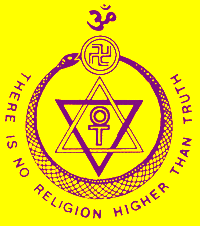A FREE INTRO TO THEOSOPHY

An Outline
of Theosophy
By
Charles
Webster Leadbeater

Cause and
Effect
In previous chapters we have constantly had to take into consideration
this mighty law of action and reaction under which every man necessarily
receives his just deserts; for without this law the rest of the Divine scheme
would be incomprehensible to us. It is well worth our while to try to obtain a
true appreciation of this law, and the first step towards doing that is to
disabuse
our minds entirely of the ecclesiastical idea of reward and punishment
as following upon human action.
It is inevitable that we should connect with that idea the thought of a
judge administering such reward or punishment, and then at once follows the
further possibility that the judge may be more lenient in one case than in
another, that he may be swayed by circumstances, that an appeal may be made to
him, and that in that way the incidence of the law may be modified or even
escaped
altogether.
Every one of these suggestions is in the highest degree misleading, and
the whole body of thought to which they belong must be exorcised and utterly
cast out before we can arrive at any real understanding of facts.
If a man put his hand on a bar of red-hot iron, under ordinary
circumstances he would be badly burnt; yet it would not occur to him to say
that God had punished him for putting his hand on the bar. He would realise
that what had happened was precisely what might have been expected under the action of the laws of
Nature, and that one who understood what heat is and how it acts could explain
exactly the production of the burn.
It is to be observed that the man’s intention in no way affects the
physical result; whether he seized that bar in order to do some harm with it or
in order to save someone else from injury, he would be burnt just the same. Of
course, in other and higher ways the results
would be quite different; in the one case he would have done a noble
deed, and would have the approval of his conscience,
while in the other he could feel only remorse. But the physical burn
would be there in one case just as much as in the other.
To obtain a true conception of the working of this law of cause and
effect we must think of it as acting automatically in exactly the same way. If
we have a
heavy weight hanging from the ceiling by a rope, and I exert a certain
amount of force in pushing against that weight, we know by the laws of
mechanics that the weight will press back against my hand with exactly the same
amount of force;
and this reaction will operate without the slightest reference to my
disturbing its equilibrium. Similarly the man who commits an evil action
disturbs the equilibrium of the great current of evolution; and that mighty
current invariably adjusts that equilibrium at his expense.
It must not be therefore supposed for a moment that the intention of the
action makes no difference; on the contrary it is the most important factor
connected with it, even though it does
not affect the result upon the physical plane. We
are apt to forget that the intention is itself a force, and a force
acting upon the mental plane, where the matter is so much finer and vibrates so
much more rapidly than on our lower level, that the same amount of energy will produce enormously greater effect.
The physical action will produce its result on the physical plane, but
the mental energy of the intention will work out its own result simultaneously
in the matter of the mental plane, totally irrespective of the other; and its
effect is certain to be very much the more important of the two. In this way it
will be seen that an absolutely perfect adjustment is always achieved; for
however mixed the motives may be, and however good and evil may be mingled in
the physical results, the equilibrium will always be perfectly readjusted, and
along every line perfect justice must be done.
We must not forget, that it is the man himself and no other who builds
his future character as well as produces his future circumstances. Speaking
very
generally, it may be said that, while his actions in one life produce
his environment in the next, his thoughts in the one life are the chief factors
in
the evolution of his character in the next. The method by which all this
works is an exceedingly interesting study, but it would take far too long to
detail it here; it maybe found very fully elaborated in Mrs. Besant’s manual on
Karma, and also in the chapter referring to this subject in her Ancient Wisdom,
and in Mr. Sinnett’s Esoteric Buddhism, to which the reader may be referred.
It is obvious that all these facts furnish us with exceedingly good
reason for many of our ethical precepts. If thought be a mighty power capable
of producing upon its own plane results far more important than any that can be
achieved in physical life, then the necessity that man should control that force
immediately becomes apparent. Not only is the man building his own future
character by means of his thought, but he is also constantly and inevitably
affecting those around him by its means.
Hence there lies upon him a very serious responsibility as to the use
which he makes of this power. If the feeling of annoyance or hatred arises in
the heart of the ordinary man, his natural impulse is to express it in some way
either in
word or in action. The ordinary rules of civilised society, however,
forbid him to do that, and dictate that he should as far as possible repress
all outward sign of his feelings.
If he succeeds in doing this he is apt to congratulate himself, and to
consider that he has done the whole of his duty. The occult student, however,
knows that it is necessary for him to carry his self-control a great deal
further than that, and that he must absolutely repress the thought of
irritation as well as its outward expression. For he knows that his feelings
set in motion tremendous forces upon the astral plane, that these will act
against the object of his irritation just as surely as a blow struck upon the
physical plane, and that in many cases the results produced will be far more
serious and lasting.
It is true in a very real sense that thoughts are things. To clairvoyant
sight thoughts take definite form and colour, the latter, of course depending
upon the rate of vibration connected with them.
The study of these forms and colours is of great interest. A description
of them illustrated with coloured drawings will be found in the book entitled
Thought Forms.
These considerations open up to us
possibilities in various directions. Since it is easily possible to do
harm by thought, it is also possible to do good by
it. Currents may be set in motion which will carry mental help and
comfort to many a suffering friend, and in this way a whole new world of
usefulness opens before us. Many a grateful soul has been oppressed by a
feeling that for want of
physical wealth he was unable to do anything in return for the kindness
lavished upon him by another; but here is the method by which he can be of the
greatest service to him in a realm where physical wealth or its absence makes
no difference.
All who can think can help others: and all who can help others ought to
help. In this case, as in every other, knowledge is power, and those who understand the law can use the law.
Knowing what effects upon themselves and
upon others will be produced by certain thoughts, they can deliberately arrange
to produce these results. In this way a man can not only steadily mould his
character in his
present life, but can decide exactly what it shall be in the next.
For a thought is a vibrations in the matter of the mental body, and the
same thought persistently repeated evokes corresponding vibrations (an octave
higher, as it were) in the matter of the causal body. In this way qualities are
gradually built into the soul itself, and they will certainly reappear as part
of the stock-in-trade with which he commences his next incarnation.
It is in this way, by working from below upwards, that the faculties and
qualities of the soul are gradually evolved, and thus man takes his evolution
largely into his own hands and begins to co-operate intelligently in the great
scheme of the Deity. For further information on this subject the best book to
study is Mrs. Besant’s Thought Power, its Control and Culture.
For more info on Theosophy
Try these

Cardiff
Theosophical Society meetings are informal
and there’s always
a cup of tea afterwards
The Cardiff Theosophical Society Website
The National Wales Theosophy Website
Theosophy
Wales Youtube Channel
Ten Benefits of Studying the Blavatskyan
Theosophical Teachings
Studying
the Blavatskyan Theosophical teachings offers numerous benefits that can
greatly enrich one's understanding of spirituality, philosophy, and the nature
of reality. Theosophy, as defined by the
writings of Helena Petrovna Blavatsky, has had a profound impact on the
spiritual and philosophical landscape of the modern world. Blavatsky's teachings
draw from a wide range of religious and philosophical traditions, including
Hinduism, Buddhism, and Western esotericism, and present a comprehensive
worldview that addresses fundamental questions about existence, consciousness,
and the cosmos.
Here
are ten benefits of studying the Blavatskyan Theosophical Teachings
1.
Exploration of Esoteric Wisdom
One
of the primary benefits of studying the Blavatskyan Theosophical teachings is
the opportunity to explore esoteric wisdom that is often not readily accessible
in mainstream religious or philosophical traditions. Blavatsky's writings delve
into the esoteric teachings of ancient cultures and mystery schools, shedding
light on profound spiritual truths that have been passed down through the ages.
By delving into these esoteric teachings, students of Theosophy can gain
insights into the nature of consciousness, the structure of the cosmos, and the
evolution of the soul or immortal self.
2.
Synthesis of Eastern and Western Philosophy
Blavatsky's
Theosophical teachings synthesize elements of Eastern and Western philosophy,
offering a comprehensive framework that integrates concepts from diverse
cultural and religious traditions. This synthesis provides students with a
broader perspective on philosophical and spiritual thought, allowing them to
see the underlying unity of seemingly disparate belief systems. By studying
Theosophy, individuals can gain a deeper appreciation for the universal
principles that underlie all wisdom traditions, fostering a sense of unity and
interconnectedness with the world's spiritual heritage.
3.
Understanding of Universal Brotherhood
Central
to Blavatsky's Theosophical teachings is the principle of universal
brotherhood, which emphasizes the essential unity of all beings and the
interconnectedness of life. By studying Theosophy, individuals can develop a
profound understanding of the interconnected nature of existence, recognizing
that all living beings are fundamentally linked and that compassion and empathy
are essential for the evolution of humanity. This understanding can lead to a
greater sense of empathy, kindness, and social responsibility, fostering a more
harmonious and compassionate society.
4.
Insight into the Nature of Reality
The
Blavatskyan Theosophical teachings offer profound insights into the nature of
reality, consciousness, and the unseen dimensions of existence. Through the
study of Theosophy, individuals can explore concepts such as the
multi-dimensional nature of the universe, the existence of subtle energy realms,
and the interconnectedness of the material and spiritual planes. This
exploration can lead to a deeper understanding of the nature of reality beyond
the limitations of the physical senses, opening up new vistas of perception and
understanding.
5. Personal
Spiritual Growth
Studying
the Theosophical teachings can be a transformative journey that facilitates
personal spiritual growth and self-discovery. Blavatsky's writings offer
practical guidance for inner development, including meditation practices,
ethical principles, and the cultivation of spiritual virtues. By applying these
teachings to their lives, individuals can experience profound personal
transformation, leading to greater self-awareness, inner peace, and a sense of
purpose and meaning.
6. Ethical
and Moral Guidance
The
Theosophical teachings provide a comprehensive ethical and moral framework that
can guide individuals in their personal and social interactions. Blavatsky
emphasizes the importance of ethical conduct, altruism, and the pursuit of
wisdom, offering practical guidance for leading a virtuous and meaningful life.
By studying Theosophy, individuals can gain clarity on moral issues, cultivate
a sense of ethical responsibility, and contribute to the greater good of
humanity.
7.
Appreciation of Comparative Religion
The
study of Theosophy encourages an appreciation of comparative religion and the
underlying unity of religious and spiritual traditions. Blavatsky's writings
explore the common threads that run through the world's religions, highlighting
universal spiritual principles that transcend cultural and historical
boundaries. By gaining a deeper understanding of comparative religion through
Theosophy, individuals can develop a more inclusive and pluralistic
perspective, fostering interfaith harmony and mutual respect.
8.
Intellectual Stimulation
The
Theosophical teachings offer a rich and intellectually stimulating framework
for exploring profound philosophical and metaphysical concepts. Blavatsky's writings
encompass a wide range of subjects, including cosmology, metaphysics, ancient
wisdom, and the evolution of consciousness, providing ample material for
intellectual inquiry and contemplation. By engaging with these teachings,
individuals can expand their intellectual horizons, develop critical thinking
skills, and gain a deeper understanding of the fundamental questions that have
intrigued philosophers and mystics throughout history.
9.
Healing and Reconciliation
The
Theosophical teachings offer insights into the nature of healing and
reconciliation, both on a personal and collective level. Blavatsky's writings
delve into the esoteric principles of healing, the nature of disease, and the
interconnectedness of mind, body, and spirit. By studying Theosophy,
individuals can gain a deeper understanding of holistic healing modalities, the
power of the mind in influencing health, and the potential for spiritual
transformation through the healing process. Furthermore, the Theosophical
emphasis on universal brotherhood and compassion can contribute to the
reconciliation of divisions and conflicts within society, fostering a more
harmonious and peaceful world.
10.
Contribution to Global Transformation
Finally,
studying the Blavatskyan Theosophical teachings can empower individuals to
contribute to the ongoing global transformation towards a more enlightened and
compassionate world. Blavatsky's vision of a spiritually awakened humanity,
working towards the betterment of all beings, inspires individuals to engage in
positive action and service to humanity. By embodying the principles of
Theosophy in their lives, individuals can become agents of positive change,
working towards the realization of a more just, peaceful, and sustainable
world.
In
summary, the study of the Blavatskyan Theosophical teachings offers a wide
range of benefits, ranging from personal spiritual growth to the potential for
global transformation. By delving into the esoteric wisdom, ethical principles,
and philosophical insights of Theosophy, individuals can expand their
understanding of the nature of reality, cultivate compassion and empathy, and
contribute to the evolution of humanity towards a more harmonious and
enlightened future. As the Theosophical teachings continue to inspire and guide
seekers of truth and wisdom, their profound impact on individuals and society
is likely to endure for generations to come.
Dave’s Streetwise Theosophy Boards
This is for everybody not just people in Wales
Theosophy Cardiff’s Instant Guide to Theosophy
General pages about Wales, Welsh History
and The History of Theosophy in Wales
Teosofia en Cardiff (Página en Español)
One Liners & Quick Explanations
The Most Basic Theosophy Website in the Universe
If you run a Theosophy Study Group you can use
this as an introductory handout
The
South of Heaven Guide to
Theosophy and Devachan
The preparation of this Website
The Spiritual Home of Urban Theosophy
The Earth Base for Evolutionary Theosophy
Classic Introductory Theosophy Text
A Text Book of Theosophy By C
What Theosophy Is From the Absolute to Man
The Formation of a Solar System The Evolution of Life
The Constitution of Man After Death Reincarnation
The Purpose of Life The Planetary Chains
The Result of Theosophical Study
An Outstanding
Introduction to Theosophy
By a student of
Katherine Tingley
Elementary Theosophy Who is the Man? Body and Soul
Body, Soul and Spirit Reincarnation Karma
Newcastle Emlyn (Castell Newydd Emlyn) is on the
Cardiganshire Carmarthenshire border
Newcastle Emlyn (Castell Newydd Emlyn) is on the
Cardiganshire Carmarthenshire border
Preface to the American Edition Introduction
Occultism and its Adepts The Theosophical Society
First Occult Experiences Teachings of Occult Philosophy
Later Occult Phenomena Appendix
Preface
Theosophy and the Masters General Principles
The Earth Chain Body and Astral Body Kama – Desire
Manas Of Reincarnation Reincarnation Continued
Karma Kama Loka
Devachan
Cycles
Arguments Supporting Reincarnation
Differentiation Of Species Missing Links
Psychic Laws, Forces, and Phenomena
Psychic Phenomena and Spiritualism
Karma Fundamental Principles Laws: Natural and Man-Made The Law of Laws
The Eternal Now
Succession
Causation The Laws of Nature A Lesson of The Law
Karma Does Not Crush Apply This Law
Man in The Three Worlds Understand The Truth
Man and His Surroundings The Three Fates
The Pair of Triplets Thought, The Builder
Practical Meditation Will and Desire
The Mastery of Desire Two Other Points
The Third Thread Perfect Justice
Our Environment
Our Kith and Kin Our Nation
The Light for a Good Man Knowledge of Law The Opposing Schools
The More Modern View Self-Examination Out of the Past
Old Friendships
We Grow By Giving Collective Karma Family Karma
National Karma
India’s Karma
National Disasters
Wales Theosophy Links Summary
Hey Look! Theosophy in Cardiff
Try these if you are looking for a
local Theosophy Group or Centre
UK Listing of Theosophical Groups
Please tell us about your UK Theosophy Group
Worldwide Directory of Theosophical Links

General pages
about Wales, Welsh History
and The History
of Theosophy in Wales
Wales is a
Principality within the United Kingdom
and has an eastern
border with England. The land
area is just over
8,000 square miles. Snowdon in
North Wales is the
highest mountain at 3,650 feet.
The coastline is
almost 750 miles long. The population
of Wales as at the 2001 census is 2,946,200.
__________________________________________
into categories and presented according to relevance
of website.

